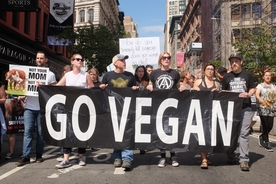It's undeniable that there's been a huge spike in the interest for vegan culture. Like assassins, vegans are now emerging from the shadows in their droves to speak the good word of ethical living. You'll know a true vegan as one who's wholeheartedly against the use of animals for anything: clothes, cosmetics, furnishings - not those 20 somethings that hit up that cool vegan stands for lunch in their battered Converses.
The creed they tend to push sounds something like "key out of the matrix is to go vegan." This is often translated to eating more consciously - actively avoiding corporations and supermarkets for their fiendishly capitalistic farming methods. Doing so will not only benefit the planet but save you from some form of nasty disease, making you live longer in the process.
As gospel goes, this one doesn't sound too bad, but a lot of people find vegans push their beliefs on you a little too hard, namely cursing you to eternal damnation for having cereal with your milk. One Netflix film looked to change that.
Recently watching the Netflix original Okja, I noticed how well the film did to normalise the argument that being a little more conscious of what we put on our plate isn't a bad idea. Its overall message is a little convoluted (we'll get into that later) but I wouldn't be surprised if people finished that film and decided they weren't going to eat meat.
This brings a lovely breath of fresh air to films that discuss veganism. Netflix for a while was rife with shockumentaries that scream "EATING MEAT CAUSES YOUR LEG TO FALL OFF", which isn't necessarily false - the consumption of red meat and processed meat has been linked to type 2 diabetes, one of whose symptoms is the loss of function of limbs that can lead to amputations.
But because they're screaming horror stories in your face, you either turn off from the issue because you realise the people pushing for change are madmen, or you're far too terrified to touch anything an animal looks at. Going from one extreme to the next (fully fledged "regular Westerner diet" to vegan) can be potentially just as damaging to the body.
At their core, a lot of these docs (or films like Okja) are trying to argue the link between diets -mostly American and Western - and disease or morbidity is something not to be scoffed at. As kind of eluded to before, their intention in theoryis good, but their method of execution could be better.
Films like What the Health, Vegucated and Food inc., can be incredibly one-sided and arguments are often cherry-picked statements as triggering as a clickbaity title (a great Vox article by Julia Belluz goes into the specifics of What the Health really well).
Whether you agree with the arguments beforehand or not, the crafted titles and overdramatic trailers laying down conspiracy theories and suggesting supermarkets are out to get us and being vegan is the only way to fight, do more than enough to raise notoriety for the piece.
Netflix push for content like this because (and this is coming from the horse's mouth) they make money off of popularity, rather than viewing figures - which they famously don't publish. Whether you turn vegan or boycott your local is not much of their concern.
Some titles do their best to provide a less obtuse argument for following a plant-based lifestyle. While I haven't watched them all, rogues like Okja, Forks over Knives and Cowspiracy explain the arguments in a more nuanced manner (or at least suggest to do so in their trailers/reviews).
This can, however, work against a vegan's fight for the greater good and Netflix's goal of drawing attention to their film roster. Using Okja as an example again (spoiler alert), after ferrying the fight against giant corporations to stop animal farming, only one animal is saved. Our protagonists don't even seem that pleased about it.
What do we take home from this? Do what you can to live a sustainable righteous life? Should we not worry about the rest of the planet, the man is going to win anyway no matter what you do? Unlike titles that shove a message down our throat, a more nuanced or balanced piece may do nothing to change the culture, solely adhering to the zeitgeist of mild veganism today.
So does that mean only triggering titles are going to work? The short answer is yes, but there is a need for supermarkets to exist. Supermarkets help keep the price of items down but the methods used don't always paint a pretty picture. Methods do need to be changed, but a lot of people seem to make blissful peace with their chicken Kievs and mashed potatoes for dinner.
The manipulation of the properties of food to make sure you buy from a particular store aren't just there for aesthetic reasons; they help can sometimes ensure you are getting the most out of your food for the benefit of your health too. This argument doesn't really work for the meat they make (or garlic and nuts, if you watched Rotten) but when handled correctly, mouths can be fed and lives can be saved with the help of large conglomerates.
In fear of making this article sound like an Okja or Forks over Knives, I'll end by saying nutritional science is not definitive because individuals react very differently to the same things. Slight changes in the DNA (of either animal or plant) can potentially have massive knock-on effects on our bodies, and even that changes from person to person. It's incredibly hard to get it right for an entire town, let alone population.
Observational studies done in films like this aren't the most accurate because while you track everything someone eats and does, because they aren't controlled like experiments, you can lose a lot of precision. Intricacies like how much animal protein can cause cancer are missed. Other factors like environment (an actual area they live or emotional internal triggers) can also be missed.
The culture of today calls for content to make the loudest noise possible to get our attention, that means being as controversial as possible or being a masterpiece in filmmaking that is relatable, has you captivated from start to finish and sparks a conversation for change. If you can't do the latter, you'll be damned sure places like Netflix do the former.
Keep this in mind you see something pushed as the next "Supersize Me".


